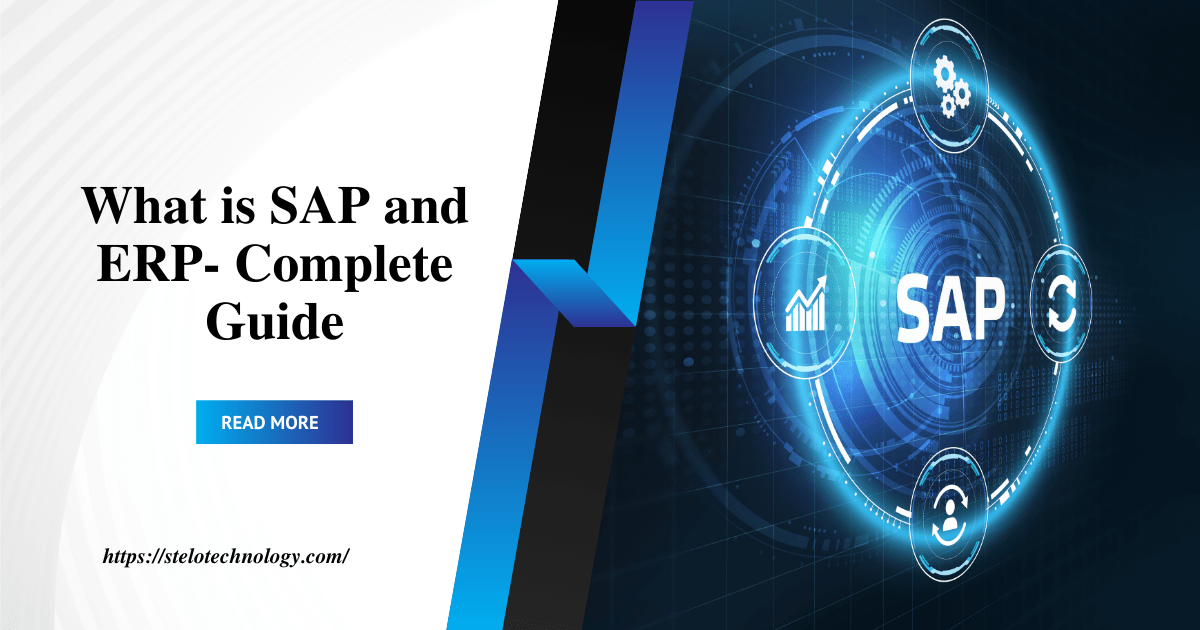In today’s business environment, it is essential to manage resources efficiently. Enterprise Resource Planning systems (ERPs) like SAP are essential tools for all businesses. This comprehensive guide will examine what SAP ERP is, their benefits and key features, as well as the implementation process and future trends.
Table of Contents
Understanding ERP
Definition of ERP

ERP is an acronym for Enterprise Resource Planning. This type of software is used by businesses to integrate and manage the most important aspects of their business. A software system that integrates planning, purchasing, inventory, sales and marketing, finance, HR, and other areas can be found in an ERP.
Core Modules in ERP
ERP systems include core modules such as:
- Financial management: Manages financial reporting and analysis, accounting, and manages the management of financial data.
- HR: Manages employee data, payroll, recruitment and performance.
- Supply Chain Management: Manages data, goods and finances associated with a product or a service.
- Customer relationship management (CRM): Manages interactions with customers, sales and service.
Evolution of ERP Systems
ERP systems have undergone a significant evolution since their conception in the 1960s. At first, ERP systems focused on inventory control and management. ERP systems have evolved over the years to include more business processes, and they integrate with new technologies. They are now more powerful and versatile.
Introduction to SAP
History of SAP
SAP, Systems, Applications, and Products in Data Processing, were founded in Germany in 1972 by former IBM engineers. It is now one of the leading software producers in the world for managing business processes.
Key SAP Products
SAP offers a number of key products, including:
- SAP HANA: A fully integrated ERP suite powered on the SAP HANA memory database.
- SAP business one: A cost-effective ERP solution for small to medium businesses.
- SAP: An on-premise ERP that supportss critical business processes.
SAP Integration with ERP
SAP ERP integrates different business functions into one unified system. This integration allows all departments to have access to real-time and consistent data.
SAP ERP: Benefits
Improved Efficiency
SAP ERP streamlines and automates business processes. This reduces the need for human intervention, and minimizes errors. The result is increased productivity and efficiency.
Data Accuracy & Accessibility
SAP ERP stores all business data in a centralized repository. This ensures that the data is accurate and available in real time. It allows for better planning and decision making.
Enhance Reporting and Analytical Tools
SAP ERP offers advanced reporting and analytical capabilities that enable organizations to gain insight into their performance and operations. This allows organizations to identify trends and make informed decisions.
SAP and ERP Features
Financial Management
SAP ERP provides comprehensive financial management features, such as accounting, financial reporting and compliance management.
Supply Chain Management
SAP ERP improves visibility and control of the supply chain, allowing organizations to better manage their inventory and procurement.
Human Capital Management
SAP ERP has robust HR management functions, including employee administration, payroll management, recruitment and talent management.
SAP ERP Implementation
Steps to Implementation
SAP ERP implementation involves several steps.
- Planning: Defining objectives, scope and timeline.
- Blueprinting : Document requirements and business processes.
- Configuration Configure the system in accordance with the blueprint.
- Testing: Test thoroughly to ensure that the system meets all requirements.
- Deployment Monitor performance and go live with the system.
Implementation Challenges
Some of the most common challenges include:
- High Costs
- Employees resisting change
- Data migration issues
- Ensuring system compatibility
Ready to enhance your software quality and accelerate your time to market? Contact us today at sales@stelotechnology.com to request a customized quote for your business!
SAP ERP Industry Applications
Manufacturers
SAP ERP is used in manufacturing to manage production planning, quality control and inventory. This ensures efficient operations and high-quality products.
Buy it Now
SAP ERP is a retail ERP that manages inventory, sales, customer relations, and supply chains. It helps improve customer service, operational efficiency, and customer satisfaction.
Healthcare
SAP ERP is a powerful tool in healthcare. It supports patient management, billing and compliance. This ensures better patient care, as well as efficient administrative processes.
Future Trends for SAP and ERP
Future trends in SAP and ERP include:
- Artificial intelligence and machine learning will be used more.
- Cloud-based ERP systems are becoming more popular
- Mobile capabilities enhanced
- Integrate with Internet of Things devices
SAP and ERP vs. other ERP Systems
Compare with Oracle ERP
SAP and Oracle ERP both offer comprehensive solutions. However, SAP is preferred due to its industry-specific capabilities and robust integration, while Oracle excels in database management and analytics.
Microsoft Dynamics – Comparison
Microsoft Dynamics is a popular choice among small and medium businesses because of its integration with other Microsoft software. SAP is chosen by large enterprises because of its comprehensive features and scalability.
Conclusion:
SAP ERP systems help businesses make informed decisions and manage resources effectively. SAP and ERP improves overall performance, data accuracy and efficiency by integrating multiple business functions into one system. SAP and ERP systems are likely to incorporate new features as technology evolves, further changing the way businesses function.


